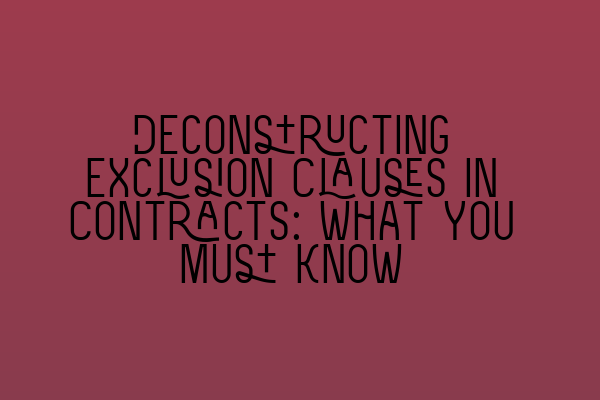Deconstructing Exclusion Clauses in Contracts: What You Must Know
Contracts are a vital part of any business or legal transaction. They outline the terms and conditions that govern the relationship between parties involved. However, when it comes to contractual agreements, one essential aspect that often requires close attention is the inclusion of exclusion clauses.
Exclusion clauses are contractual provisions that seek to limit or exclude liability for certain types of loss or damage. While they are a common feature in many contracts, it is essential for both parties to fully understand their implications. In this article, we will deconstruct exclusion clauses and delve into what you must know about them.
The Purpose of Exclusion Clauses
The primary purpose of an exclusion clause is to allocate risk and protect the interests of the parties involved in a contract. They are used to limit one party’s liability for certain events or circumstances that may arise during the course of the contract. This protection ensures that the party is not held responsible for losses or damages that fall within the scope of the exclusion clause.
Different Types of Exclusion Clauses
Exclusion clauses come in various forms, and it is crucial to identify them in a contract. Some common types include:
- Limitation Clauses: These clauses aim to limit the amount of liability that one party may incur in the event of a breach of contract.
- Exemption Clauses: These clauses seek to exclude one party’s liability altogether for specific events or circumstances.
- Indemnity Clauses: These clauses require one party to compensate the other for any loss, damage, or liability that may arise from a particular event or circumstance.
The Enforceability of Exclusion Clauses
While exclusion clauses are commonly used, it is important to note that their enforceability can be subject to legal scrutiny. Courts often apply a strict approach when interpreting and assessing the validity of exclusion clauses. They will consider various factors, including:
- The clarity and specificity of the language used in the clause
- The bargaining power and equality of the parties
- The nature and context of the contract
- The reasonableness of the clause
Based on these considerations, a court may find an exclusion clause unreasonable or against public policy, rendering it unenforceable.
Implications of Exclusion Clauses
Understanding the implications of exclusion clauses is crucial for both parties entering into a contract. For the party seeking to exclude liability, it provides a level of protection and risk mitigation. Conversely, for the party not protected by the clause, it is imperative to carefully assess the potential risks and losses involved and ensure adequate protection is in place.
It is also worth noting that exclusion clauses may not cover all types of loss or damage. Some areas, such as personal injury, may be excluded by law, regardless of the presence of an exclusion clause.
How to Approach Exclusion Clauses
When encountering exclusion clauses in contracts, it is crucial to take the following steps:
- Read Carefully: Pay close attention to the wording and scope of the exclusion clause to understand its limitations and potential impact.
- Seek Legal Advice: If uncertain about the implications of an exclusion clause, consult a solicitor who specializes in contract law.
- Negotiate and Amend: If the exclusion clause is deemed unreasonable or unfair, communicate with the other party to negotiate and amend the terms.
- Consider Insurance: Evaluate whether obtaining appropriate insurance coverage can protect against unforeseen events or circumstances not covered by the exclusion clause.
Conclusion
Exclusion clauses are a critical component of contracts that can significantly impact the rights and liabilities of the parties involved. Proper understanding, careful consideration, and expert legal advice are essential when it comes to navigating the complex world of exclusion clauses. By following this guidance, both parties can ensure that their interests are adequately protected.
If you would like to explore further topics related to contract law and SQE preparation, we recommend checking out the following articles:
- SQE Sample Papers: Practice for Exam Success
- Peer Discussions Post-Mock: Learning from Collaboration and Feedback
- Adjusting Strategy Based on Mock Performance: Improving Your Approach
- Strengthening Weak Areas in SQE: Targeted Practice for Improvement
- Effective Revision Techniques for SQE: Maximizing Retention and Recall
